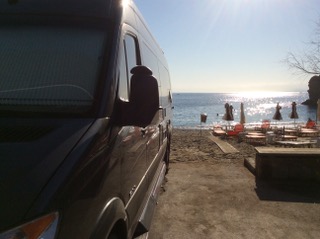| <- Back to main page |
by Phyllis Carol Agins
Traveling by camper through Europe reveals what is often hidden. In your RV you find quiet corners where you can park for the night. You shop in local markets for extraordinary produce and for a hundred varieties of pasta. You watch factories and fields, villages and abandoned temples slide by. In the campsites near the major cities, you meet people from everywhere—those who take frequent trips in their own campers, those who arrive from Australia to rent an RV for two weeks. Wandering by camper, you encounter daily life that can be both foreign and familiar. But in Crete another story reveals itself.
My husband and I sleep on the ferry in our camper along with all the other road gypsies who travel in RVs—now sailing from Athens to Crete and its ancient history. Yet, on the island, sites for RVs are very few. No problem. We are equipped to boondock: solar panels for energy, a generator to cook. TV and surround sound from an American-built stereo system. We sleep easily, comfortable under the whir of the super fan that forces cool night air over our bodies. We are hardly suffering as we travel from city to ancient palace.

At the eastern tip of the island, we find a shaded lot across from the sea. That night we loosely plan the next day. Maybe we’ll drive to the wild side of the island or visit another Minoan site. Perhaps explore the ancient myth of Atlantis that has always fascinated or revisit the family that welcomed us with Cretan desserts, lute music, and an impromptu dance lesson. And there is always the blue-milk Mediterranean, far away from our Nice, France, base and far warmer and wilder here than I’ve ever imagined.
The morning comes with the sound of children laughing. A baby gurgles. Another camper, I think. Often we’ll wake to see that people have parked all around during the night, accepting our lead that the site is flat and quiet—a village of campers.
But no camper has claimed the spot next to us. Instead, with all four doors flung open, an old car squats nearby. Children tumble from front seat to back in the early light. By the open front door, two men sleep on a thin blanket spread across the hard concrete. A six-month-old baby lies nearby, his arms flailing against the open air, his cries threatening to wake the sleeping adults. An older boy soothes him with soft words, then pulls a clear plastic bag from his pocket. The baby sucks on the bag, laughing as he passes it from hand to hand. A woman, holding a cup of coffee from the restaurant across the street, sits heavily on a folding chair.
I know who they are: les gens de voyage, a category that includes the Romas and any people who travel constantly—from carnival to harvest, from city to seaside ports. I’ve seen them all over Europe. At traffic lights they pour soapy water on windshields, only to offer to wipe it off for a coin. Women wait at supermarkets with one hand out and a baby clutched in the other arm. Kerchiefed old women kneel for hours on cardboard in front of those churches where tourists visit, a begging dish before their folded legs. Over time I’ve dropped coins in those open hands, trying, somehow, to change the world with a euro. And every summer stories about gypsies fill the news until the recent waves of migrants from the Middle East and Africa have demanded more attention with tales of exclusion and suffering and war.
I have noticed the people who travel everywhere, the more wealthy living in white fifth wheels that long ago replaced the painted, wooden caravans of myth. But what about the others? I never saw how they travel. Or where they sleep or how they take care of their children, managing diapers and baby bottles.
This morning my husband and I don’t need to discuss what we watch. We take three shopping bags, filling them with all our refrigerator holds. We add toilet paper and the unopened quart of milk. A quick-to-dry bath towel. Energy bars. Two ceramic cups. Instant coffee. A box of plastic spoons. Bars of soap. Batteries and a flashlight. Whatever we can find.
“I want to give money,” I say, pulling euros from my bag.
“We’ll tuck it here,” my husband answers, folding the money into a cup. “Not to embarrass them.”
He is the one who opens the door wider. Who travels across the five feet of pavement. Who holds out his arms, bags dangling in each, to the woman. She smiles hesitantly, looking from him to me in the open door, and finally taking the bags with a slow determination.
The children peer inside the sacks, pulling out the bread first and eating quickly without any of the typical European butter or jam spread thickly on top. They wave wildly as my husband starts the truck. The two men pull themselves from the blanket and stretch. The baby cries when his plastic bag floats away. His mother picks him up and settles him on her hip, then waves too. And just as we pull away, she places her hand to her heart.
I repeat the universal gesture. Hand to heart—with my hopes for her and her children. My wish that they always have food. That the baby will have a real toy. That they will always find protected places to sleep and something more than a blanket-covered pavement. Hand to heart, two women who would never have met. I send my prayers for her family into the morning Cretan sky. 